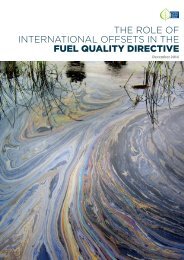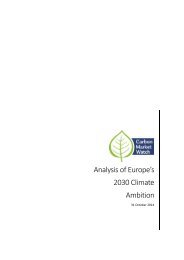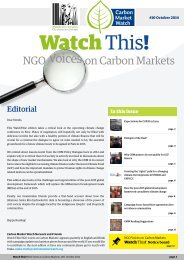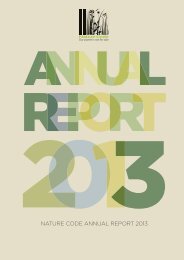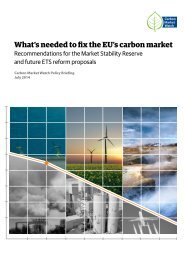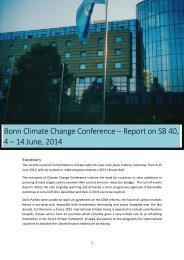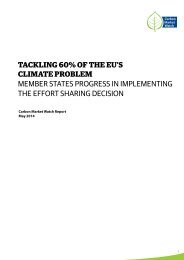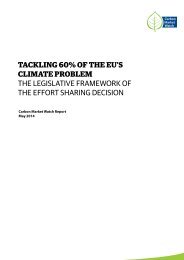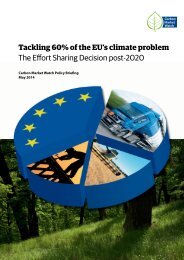NATURE CODE ANNUAL REPORT 2013
Create successful ePaper yourself
Turn your PDF publications into a flip-book with our unique Google optimized e-Paper software.
Bumpy take-off for EU<br />
aviation emissions regulation<br />
In 1997, the Kyoto Protocol required states to find solutions through the UN aviation body, the International Civil Aviation Organization<br />
(ICAO). However, ICAO failed to move for years to agree binding mitigation measures and as a response the EU decided to include all emissions<br />
from flights to and from EU airports in the EU ETS starting in 2012. This unilateral decision has been very controversial, triggering<br />
fierce international opposition and threats of trade war by many countries including the US, Russia, China and India. As a sign of compromise<br />
and in order to give ICAO enough time to negotiate a global aviation agreement, the EU decided to exclude international flights from<br />
its ETS for the 2012 period. This was agreed in September 2012 but as the derogation was set to expire in one year, the debate resumed once<br />
again in <strong>2013</strong>. Recently, the EU backed down again, extending once more the derogation until 2016, hoping that progress will be made at<br />
ICAO’s triennial Assembly in 2016.<br />
Carbon Market Watch has been active in the debate around regulating aviation emissions. Through our research and advocacy efforts, we<br />
supported EU efforts to regulate emissions from international aviation albeit with a maximum degree of environmental integrity. Covering<br />
only partly the emissions from EU airspace was a political compromise at the expense of international pressure. While some MEPs were<br />
highly vocal against extending the derogation, overall support from the EU Parliament was not enough.<br />
Carbon Market Watch has actively lobbied that the EU should not extend its initial 2012 derogation and increase pressure in ICAO for a<br />
global deal with high environmental integrity.<br />
We will continue to stay focused on ICAO negotiations that are meant to steer a global market based mechanisms in 2016.<br />
“Only a cap-and-trade scheme with<br />
a stringent cap and a limit on the<br />
use of offsets will create sufficient<br />
incentives for essential emission<br />
reductions”<br />
Aviation Policy Briefing and UNFCCC side event invitation, June <strong>2013</strong><br />
DID YOU KNOW ?<br />
Greenhouse gas emissions from international aviation make up 5% of global emissions. At the<br />
same time, aviation is the most carbon intensive mode of transport. If aviation emissions would<br />
represent a country, this would be the 7th most polluting country in the world. Future projections<br />
foresee a steep growth of emissions from international aviation.<br />
Carbon Market Watch - Reuters Point Carbon, June <strong>2013</strong>.<br />
CAMPAIGN PAGE: http://carbonmarketwatch.org/category/aviation-shipping/<br />
11




